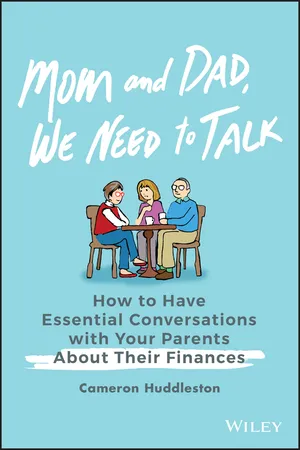
Mom and Dad, We Need to Talk
How to Have Essential Conversations with Your Parents About Their Finances
- English
- ePUB (mobile friendly)
- Available on iOS & Android
Mom and Dad, We Need to Talk
How to Have Essential Conversations with Your Parents About Their Finances
About This Book
Learn to start open, productive talks about money with your parents as they age
As your parents age, you may find that you want or need to broach the often-difficult subject of finances. In Mom and Dad, We Need to Talk: How to Have Essential Conversations with Your Parents About Their Finances, you'll learn the best ways to approach this issue, along with a wealth of financial and legal information that will help you help your parents into and through their golden years.
Sometimes parents are reluctant to address money matters with their adult children, and topics such as long-term care, retirement savings (or lack thereof), and end-of-life planning can be particularly touchy. In this book, you'll hear from others in your position who have successfully had "the talk" with their parents, and you'll read about a variety of conversation strategies that can make talking finances more comfortable and more productive.
- Learn conversation starters and strategies to open the lines of communication about your parents' finances
- Discover the essential financial and legal information you should gather from your parents to be prepared for the future
- Gain insight from others' stories of successfully talking money with aging parents
- Gather the courage, hope, and motivation you need to broach difficult subjects such as care facilities and end-of-life plans
For children of Baby Boomers and others looking to assist aging parents with their finances, Mom and Dad, We Need to Talk is a welcome and comforting read. Although talking money with your parents can be hard, you aren't alone, and this book will guide you through the process of having fruitful financial conversations that lead to meaningful action.
Frequently asked questions
Information
CHAPTER 1
Get Over Your Fear of Having “The Talk”
- “I still find it challenging to speak about money with my parents. We can discuss religion, politics, and relationships, but money remains a taboo subject,” Jason said.
- Olivia said she's tried to have conversations with her mom to find out how she will support herself in retirement. But her mom always changes the subject. “I'm kind of afraid to ask more specific questions,” Olivia said. “I don't want her to be offended. I don't want her to feel like I'm being nosy.”
- “I really don't like those conversations,” Noah said about discussing his parents' wills. “I'm really not fond talking about the death of my parents as a potential thing.”
- Talking about money with her father has never been easy, Meg said. It's a conversation she knows she needs to have now that he's approaching 70, has unstable finances and long-term health problems, and is in a second marriage. But she's afraid. “Discussing the full scope of his finances, along with how he and my stepmother have discussed their planning in light of our blended family composition, has been intimidating enough that I've shied away from approaching it with him.”
YOUR FEARS VERSUS REALITY
- Fear: My parents will think I'm being nosy.
- Reality: They might be glad you asked because they had been meaning to talk with you. Even parents who are reluctant to talk might be grateful, in the long run, that you took the initiative to have a conversation and help them with money issues.
- Fear: My parents will think I'm being greedy.
- Reality: If you make it clear that you're asking about their finances out of concern for their well-being, they will see that you have their best interests at heart – not just yours.
Table of contents
- Cover
- Table of Contents
- INTRODUCTION: Why the Money Talk Is Essential
- CHAPTER 1: Get Over Your Fear of Having “The Talk”
- CHAPTER 2: Don't Wait
- CHAPTER 3: Reasons Your Parents Might Be Reluctant to Talk
- CHAPTER 4: What Happens If You Don't Have the Conversation
- CHAPTER 5: Start by Talking to Your Siblings
- CHAPTER 6: What Not to Say
- CHAPTER 7: Conversation Starters
- CHAPTER 8: A Step-by-Step Approach to a Successful Conversation
- CHAPTER 9: What You Need to Know
- CHAPTER 10: Talking to Your Parents About Estate Planning Documents
- CHAPTER 11: Talking to Your Parents About Scammers
- CHAPTER 12: Talking to Your Parents About Long-Term Care
- CHAPTER 13: Talking to Your Parents About When It's Time to Move
- CHAPTER 14: If at First You Don't Succeed …
- CHAPTER 15: Getting Through to Reluctant Parents: Success Stories
- CHAPTER 16: What to Do If Your Parents Won't Talk
- CHAPTER 17: Pay It Forward: Start Talking to Your Kids
- A Final Note
- Additional Resources
- About the Author
- Acknowledgments
- Index
- End User License Agreement